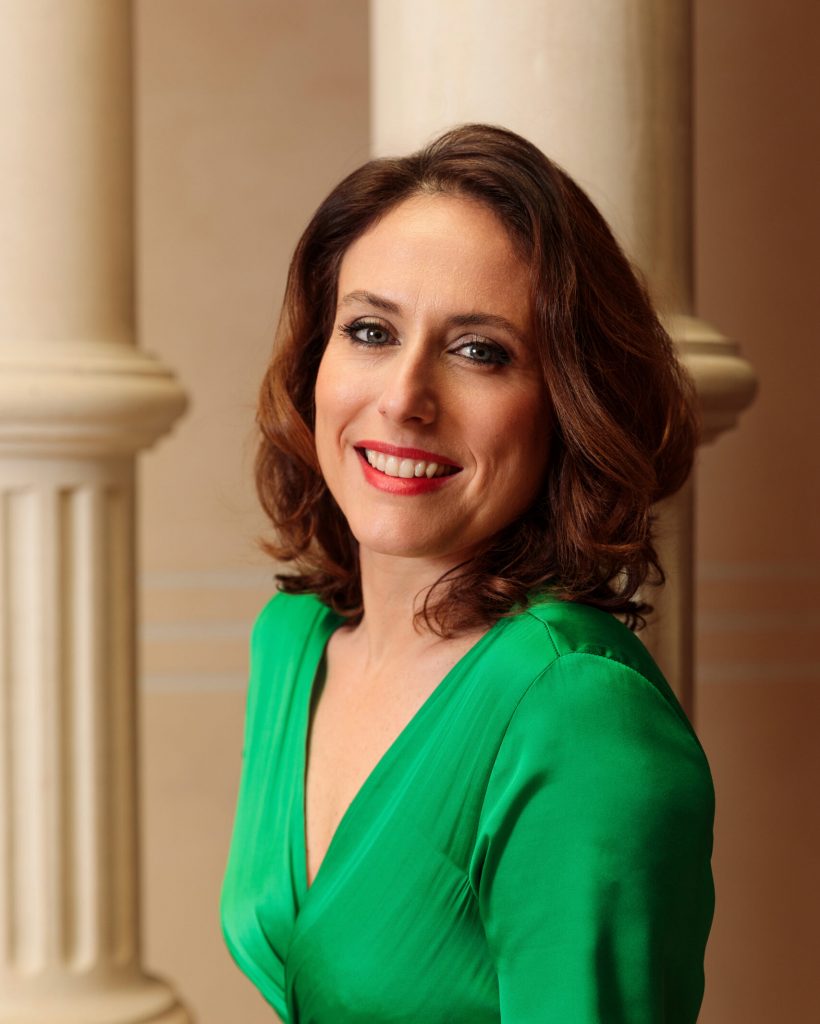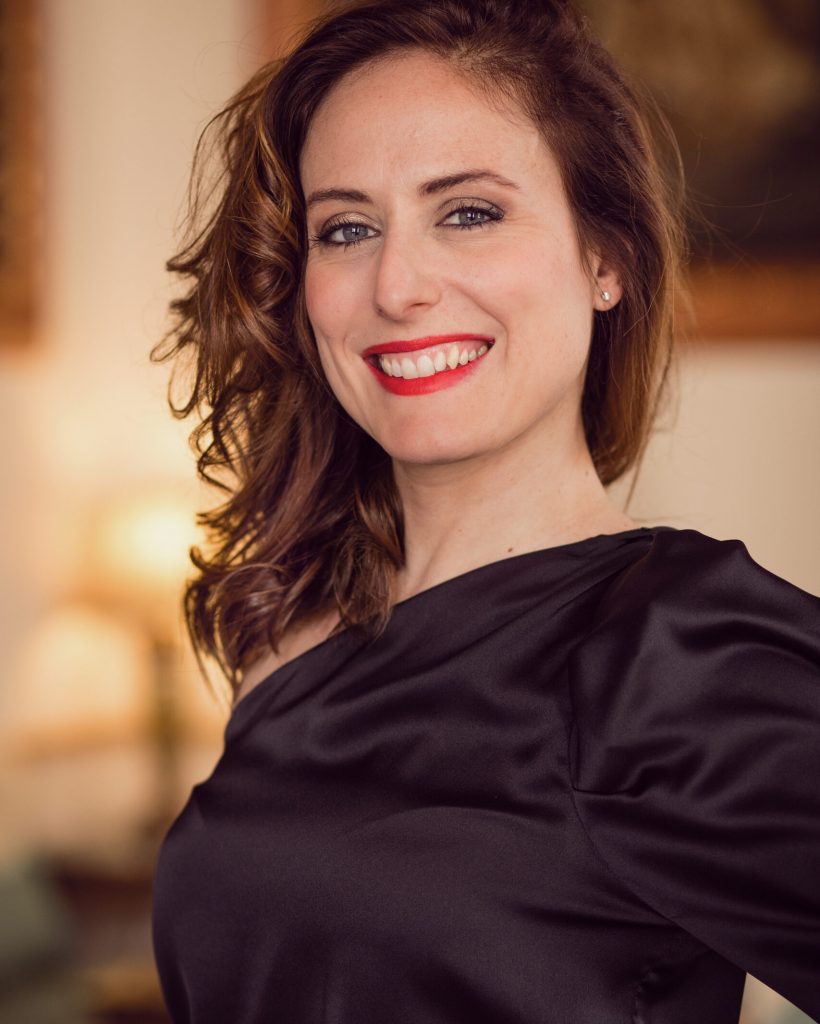

Biography
María Reina Navarro Crespo began her musical education studying classical guitar at the Conservatory of Novelda (Spain).
She graduated in Human Sciences from the University of Alicante with the Outstanding Achievement Award. She then began her training as a soprano at the conservatories in Geneva and Zurich and at the Hochschule für Musik in Lausanne. At the same time, she was studying musicology at the University of Geneva.
In July 2014 she completed her training as a soloist with the soprano Magarida Natividade with a Masters in Interpretation, with distinction, at the Escuela de Música de Cataluña. In the same year, she was a finalist at the international singing competition of the “Bell’arte” Foundation in Belgium. She gained her first professional stage experience with the chorus of the Lausanne Opera. In oratorio productions she is fortunate to have worked with conductors such as Ton Koopmann, Ottavio Dantone, Natalie Stutzmann, Christian Zacharias, Jean Christoph Spinosi and Leonardo García Alarcón. She has featured in works such as the Motet In Furore Lustissimae Irae by Vivaldi or the two Salve Reginas by Schubert and Leonardo Leo in Alicante, Spain, the Coronation Mass by Mozart in Marienmünster by Diessen near Munich, the Johannes Passion by J.S. Bach in St. Michael in Schwäbisch Hall, and the Mottete Exsultate Jubilate by W.A. Hear Mozart with the Camerata Europeana in the Neue Schloß in Stuttgart. Read more
She has performed internationally in halls such as the Lausanne Opera, the Théatre des Champs Elisées, the Salle aux Grains de Toulouse, the Arsenal de Metz, the Théatre du Parc in Brussels, the Museo Nacional de Cataluña, the Auditorium de Radio France and the Opéra National de Paris at home. In addition to her work as a soloist and her passion for teaching singing, María Reina Navarro Crespo sings in renowned international ensembles such as the Choeur de Radio France, Sequenza 9.3, or the Choeur de Chambre de Namur. She has taken part in master classes given by Dale Duesing and Luisa Castellani, among others, and regularly receives valuable advice from Helene Schneiderman.
Media
Konstanz, 2024
Gloria Revert, piano.
LIVE Recital "La música de los grandes salones", Casino de Novelda, Spain, 2014.
Xavier Rivera, piano.
Brussels, September 2015

Repertoire
Solo Repertoire
Oratorio:
BACH, Cantate BWV 28, “Gottlob! nun geht das Jahr zu Ende”.
BACH, Cantate BWV 115, “Mache dich, mein Geist bereit”.
BACH, Johannes Passion.
BACH, Mattheus Passion.
CARISSIMI, Jephté: Filia*.
DEBUSSY, L’enfant prodigue: Lia*.
DIABELLI, Pastoralmesse in F, op. 147.
LEO, Salve Regina.
MOZART, Krönnungsmesse, KV 317.
MOZART, Messe in C moll, KV 427 (Soprano 1).
MOZART, Motet Exultate Iubilate.
HÄNDEL, Messiah, HWV 56.
ROSSINI, Stabat Mater.
SCHUBERT, Salve Regina, op. 140 in C.
PERGOLESI, Stabat Mater.
TELEMANN, Nun komm, der Heiden Heiland.
VIVALDI, Mottetto RV 626, In furore iustissimae irae.
SCHUMANN, Das Paradis und die Peri (Hervé Klopfenstein).
BELLINI, Puritani: Elvira*.
BELLINI, I Capuleti e I Montecchi: Giulietta*.
BELLINI, Sonnambula: Lisa, Amina*.
BEETHOVEN, Fidelio, Marzelline.
BIZET, Les pêcheurs de perles: Leila*.
DONIZETTI, Don Pasquale: Norina*.
HÄNDEL, Amadigi: Melissa. HÄNDEL, Cleopatra: Cleopatra*.
HÄNDEL, Alcina, Morgana.
MOZART, Il re pastore: Aminta*.
MOZART, Zauberflöte: Papaguena, Pamina*.
MOZART, Le nozze di Figaro: Contessa, Susanna*.
MOZART, Der Schauspieldirektor, Mademoiselle Silberklang.
MOZART, Don Giovanni: Zerlina*, Donna Elvira*.
MOZART, Cosí fan tutte: Despina, Fiordiliggi*.
PUCCINI, La Bohème: Musetta*.
PUCCINI, Gianni Schicchi: Lauretta*.
RAMEAU, Hippolyte et Aricie, Une bergère, Phèdre*.
VERDI, Il corsaro: Medora*.
VERDI, Falstaff: Nanetta*.
WEBER, Der Freischütz: Ännchen*.
Cyclus:
BERG, Sieben frühe Lieder.
DALLAPICCOLA, Quattro Liriche di Antonio Machado.
GINASTERA, Cinco canciones populares argentinas.
GRANADOS, Goyescas.
RODRIGO, Cuatro madrigales amatorios.
ROSSINI, La regata venezziana.
FALLA, Siete canciones populares espanolas.
Ausgewählte Lieder von:
Hector BERLIOZ
Leonard BERNSTEIN Johannes BRAHMS
Ernest CHAUSSON
Claude DEBUSSY
Herni DUPARC
Reynaldo HAHN
Franz LISTZ
Felix MENDELSSOHN-BARTHOLDY
Federico MOMPOU
W.A. MOZART
Joaquín RODRIGO
Franz SCHUBERT
Robert und Clara SCHUMANN
Maurice RAVEL
Max REGER
Camille SAINT-SAENS Richard STRAUSS
Anton WEBERN
Hugo WOLF
N.B.: * Ausschnitte
Choir and ensemble repertoire
Oratorio:
BACH, Magnificat (Ottavio Dantone).
BACH, Johannes Passion (Ton Koopman).
BACH, H-moll Messe ( Leonardo García Alarcón)
BRAHMS, Ein Deutsches Requiem (Gleb Skvortsov).
HÄNDEL, Messiah (Jean Christoph Spinosi, Natalie Stutzmann)
DVORÁK, Stabat Mater (Christian Zacharias).
MOZART, Requiem KV 626 (Gleb Skvortsov).
SCHUMANN, Das Paradis und die Peri (Hervé Klopfenstein).
BELLINI, Norma (Roberto Rizzi Brignoli, Massimo Gasparon).
GOUNOD, Roméo et Juliette (Miquel Ortega, Arnaud Bernard).
MOZART, Die Zauberflöte (Theodor Guschlbauer, Pet Halmen).
MOZART, Le Nozze di Figaro (Due donne, contadine), (David Miller, Eric Gobin).
LECOCQ, La fille de Madame Angot (Nicolas Chalvin, Anémone).
OFFENBACH: La Périchole (E. Joel-Hornak, Omar Porras).
OFFENBACH: Orphée aux enfers (Dominique Trottein, Claire Servais).
OFFENBACH: Les Contes de Hoffmann (Yannis Pouspourikas, Julie Depardieu).
RAMEAU, Les Indes Galantes (Leonardo García Alarcón, Clement Cogitore).
ROSSINI, Otello (Corrado Rovaris, Giancarlo del Monaco).
VERDI, Un ballo in maschera (Stefano Ranzani, Philippe Sireuil).
VERDI, Falstaff (Nir Kabaretti, Arnaud Bernard).
Upcoming events
Collegium Musicum: Das Schöne vergeht
Johan Sebastian Bach – Wer nur den lieben Gott lässt walten
Felix Mendelssohn-Bartholdy – Wer nur den lieben Gott lässt walten
Johannes Brahms – Nänie
Peteris Vasks – Dona Nobis Pacem
Felix Mendelssohn-Bartholdy – Orgelsonate op. 65 Nr. 6 in d-Moll
Chor des CMO
María Reina Navarro Crespo, Sopran.
Daniel Seeger, Orgel
Eckart Manke, Leitung
organisiert durch das Collegium Vokale Bodensee
https://www.collegium-musicum.ch/programm/saisonprogramm-2023/
Kirche St. Verena Konstanz-Dettingen
Saturday, 3.5.2025, 18h00
Sonntag, 4.5.2025 17:00 Uhr
Bodensee Philharmonie Abokonzert.
Symphonie Nr. 8 für Sopran, Chor und Orchester »Die Glocke«
Sinfonischer Chor Konstanz - Chor
Johanna Wokalek - Sprecherin
Gabriel Venzago - Chefdirigent
Maria Reina Navarro Crespo, Sopran
Julia Sophie Wagner, Sopran
Tickets:
Bodensee Philharmonie - Abo- und Kartenbüro
Fischmarkt 2
78462 Konstanz
Tel. 07531 900 2816
philharmonie-karten@konstanz.de
http://www.bodensee-philharmonie.de
Konzil
Friday, 23.5.2025, 19h30
Saturday, 24.5.2025, 19h30
Sunday, 25.5.2025
Matinée a la ocasión del día internacional del Modernismo, organizado por la Fundación Mediterráneo
María Reina Navarro Crespo, soprano
Cuarteto de Cuerda.
Concertino: Luis Segura
Casa Museo Modernista de Novelda
Sunday, 08.06.2025
Past events
Touché! Ein Französischer Liederabend.
Werke von Duparc, Debussy, Berlioz, Boulanger, etc.
Maria Reina Navarro Crespo, Soprano
Eckart Manke, Klavier.
Konzertsaal der Musikschule Konstanz
18. Januar 2024
Helene and friends!
Konzert zugunsten der Ukraine, Charity Concert for Ukraine, Helene Schneiderman und Freunde.
Maria Reina Navarro Crespo, Soprano
Gloria Revert Lázaro, piano
Ev, Gemeindehaus Elly Heuss-Knapp, Stuttgart (Degerloch). Germany
25. November 2023
Orientalismo, modernismo y el milagro español .
Recital canto y piano. Obras de Delibes, Falla, Granados, etc.
Maria Reina Navarro Crespo, Soprano
Gloria Revert Lázaro, piano
Casa Museo Modernista, Novelda (Alicante). España
20. Oktober 2023
International Women Day’s Recital.
Mujeres. Modernas. Women Composers around the Modernism era.
María Reina Navarro Crespo, Soprano
Gloria Revert, Piano.
Works of Nadia Boulanger, Alma Mahler, Amy Beach, Pauline Viardot and others.
Alicante, Spain.
23. März 2023
Soprano II solo Oratorienchor Frauenfeld Alexandra Schmid, Leitung
Frauenfeld, Schweiz / Switzerland
15. Mai 2023
Vocal Coaching & Cultural Dissemination
Singing helps to channel emotions and simply feel good. However, learning to sing is much more: you learn a new way to breathe!
For years, I have been teaching the art of classical singing with passion. In my lessons, I give my students the tools that enable them to develop their own instrument – their voice – with a healthy vocal technique and a positive basic attitude.
Contact
Maria Reina Navarro Crespo
Phone
- +49 176 249 252 20
Address
- Konstanz (DE)

Copyright © 2024 Maria Reina Navarro Crespo. All rights reserved.